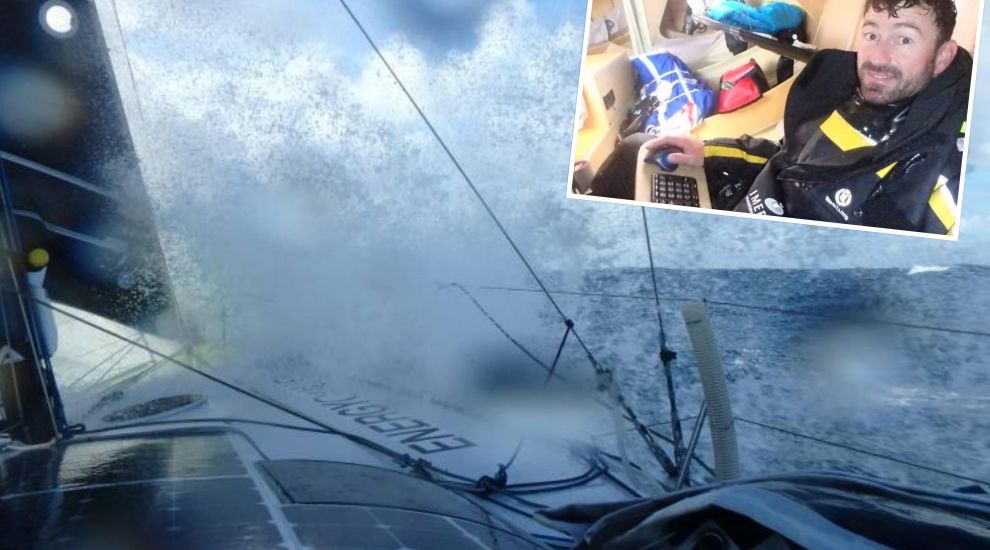

A Jersey sailor and his teammate have battled difficult sailing conditions in the first three days of the Transat Jacques Vabre but managed to keep the race lead with their zero-emission boat.
The duo - Jerseyman Phil Sharp and Pablo Santurde - were the first to cross the line when they set off from Le Havre for Salvador de Bahia on Sunday, and had to battle very strong currents as well as six-metre waves to maintain their position.
The first few days of the 4,350-mile race, which follows the historic coffee trading route between France and Brazil, have proved to be quite challenging - even for experienced sailors like Phil and Pablo.
It’s wild aboard #ImerysCleanEnergy the motion on board is violent & shocking See it for yourself @TransatJV_fr @AssoClass40 #TJV2017 pic.twitter.com/ExBylWfyuU
— Phil Sharp Racing (@PhilSharpRacing) November 7, 2017
After briefly losing the lead, the pair managed to bring the Imerys Clean Energy, a zero-emission monohull, to the front of the Class 40 pack on Tuesday, amid challenging conditions. They jumped from the fourth to the first place, passing two newly-launched boats which are four years younger than Imerys Clean Energy. Team Meteorologist Jure Jerman said that the ships were reporting winds of up to 35mph on the South West front and gusts of over 45mph on the cold side, with extremely steep and high waves. Forecasts predicted a maximum wave height of over 10m.
Luckily, Team Imerys was able to make the most of the dreadful conditions. Phil Sharp wrote: “I’ve just come off shift from the most insane two hours of helming! Literally, 38 knot squalls using our big reacher (sail)… the boat is on fire! I’m relieved to see that despite being on a less competitive at ‘reaching’ boat, we are moving up the rankings. We have a secret weapon on board. The large reaching sail we are currently flying was re-developed and optimised specifically for this race, and for precisely these strong winds. So, currently, in these conditions we are reaching top speeds and maximising the boats potential.”
Power reaching in 1st place #ImerysCleanEnergy are back in control, but can they hold on & extend their lead? https://t.co/4mQ54FdgAF pic.twitter.com/SxlgjbzGWi
— Phil Sharp Racing (@PhilSharpRacing) November 7, 2017
But the island sailor and his Spanish teammate, who were adversaries in previous races, have also had a few hiccups. Phil added: “The spinnaker pole flew off, which we have now retrieved and reassembled, and secondly (would you believe it?!) after considerable time preparing the electronics before the race we’ve already had an issue. The wind vane malfunctioned so we were left unable to receive any wind data! Luckily our blindness was short-lived as we have rigged up the emergency spare – phew.”
They were not the only teams facing technical challenges. The French-British team on board Campagne de France had to head to a port to fix their damaged rudder while the two sailors on Colombre XL had troubles with their engine which refused to start.
On Wednesday, things seemed to improve as the fleet sailed towards the centre of the Azores High and the wind speed reduced to 18 to 27mph. Jure Jerman explained: “The weather is slowly becoming more stable, and the upper air trough has moved towards the East. Here comes the next big decision: where to jibe? Phil and Pablo will have to weigh up a decision to best position themselves in a good sailing angle suitable for #ImerysCleanEnergy without the drawback of less wind. It seems that they will have to make a compromise."
Leaders It's been an incredible 24hrs for Phil & Pablo, battling their way to the front in very difficult conditions with chaotic waves & strong winds Follow the team as they head out into the wild Atlantic with hourly tracker updates https://t.co/4mQ54FdgAF pic.twitter.com/XoM3pzZ4tJ
— Phil Sharp Racing (@PhilSharpRacing) November 8, 2017
Having passed the Cape Finisterre on the coast of Galicia, Spain, Phil and Pablo extended their lead on the rest of the fleet on Wednesday evening. Despite the lack of sleep - the duo are only getting three to four hours in a day in a soaked sleeping bag - Phil said: “The conditions we had yesterday were insane, pushing the boat like that pretty much the whole day at speeds on the limit was quite an experience. We’ve been pushing really hard and when we realised we’d taken a big advantage it was hugely positive for us and we’ve been really spurred on to try keep extending.”
But while weather conditions seemed more clement, the duo faced technical issues.The antenna on their main satellite system failed on Wednesday morning leaving them unable to download weather files. With no outside assistance allowed, they could find themselves in a tricky situation as both the Class40 and the back of the larger Imoca 60ft monohull fleet will have to cope with squalls, gusting up to 30 knots and big seas in the open seas off Portugal as they head to the Azores. They are hoping not to sail "blind" for too long as positioning the boat favorably is crucial in the Transat.
Phil and Pablo are hurtling towards the Azores in @Imerys in 1st place in @TransatJV_fr All electronics have failed. Very sleep deprived. Exhausted. Only 3,565 miles to go... Stick with it guys @PhilSharpRacing pic.twitter.com/XOMqDp5m7O
— BRUICHLADDICH Whisky (@Bruichladdich) November 8, 2017
Comments
Comments on this story express the views of the commentator only, not Bailiwick Publishing. We are unable to guarantee the accuracy of any of those comments.